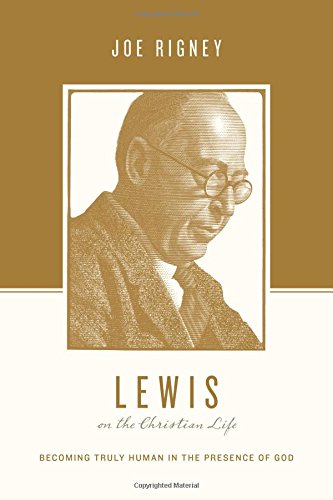A Book Review from Books At a Glance
By Andrew J. Spencer
The exposure of many contemporary Christians to the work of C. S. Lewis is often limited to his greatest hits. This list might include The Chronicles of Narnia, Mere Christianity, and, less frequently, Surprised by Joy. The more rugged fan might venture into a slightly broader range of his essays and fictional works, including works like The Abolition of Man, God in the Dock, and The Screwtape Letters. Behind the first and second tiers of Lewis’ most popular works, however, there is a deep well of published material that exemplifies a largely consistent and unified worldview and is often helpful to growth in the Christian life. Often, this well of wisdom and clear thinking goes untapped.
In his recent book, Lewis on the Christian Life, Joe Rigney digs beneath the fecund surface of Lewis’ oeuvre to expose some of the wealth of thinking that can serve to edify the church. His book is a worthy addition to the growing series of introductions to significant Christian thinkers in the Theologians on the Christian Life series from Crossway. The whole series has been excellent and this volume is no exception.
Rigney’s approach in Lewis on the Christian Life is less biographical and more topical. This is helpful since biographies of C. S. Lewis seem to multiply like rabbits, as any researcher into the life of Lewis knows. In the seventeen chapters of this volume, Rigney manages to be both appreciative and critical, finding the points where Lewis is particularly helpful and noting where his positions were misinformed or misdirected.
Lewis is most helpful in dealing with the core claims of Christianity. He is, after all, perhaps most well known for promoting the idea of mere Christianity––that is, Lewis promoted a robust faith in the central aspects of the orthodox tradition. The value of this approach becomes evident in Rigney’s volume. It is clear that Lewis articulates a version of Christianity that does not diminish the faith once and for all delivered to the saints. Mere Christianity is not a rush to the lowest common denominator of belief, as presented in most ecumenical movements. Rather, Rigney shows that the mere Christianity Lewis espouses is a bounded version of Christianity with a well-anchored center. To shift metaphors, it becomes clear that Lewis is attempting to plant the flag of Christianity as near the heart of common belief as can be, all the while acknowledging that if one strays too far from those core beliefs one should no longer consider themselves a Christian.
Rigney works through Lewis’ thought on a number of topics. In Chapter One, he begins by highlighting the theme of choice, which is present throughout everything Lewis wrote. The most significant choice, which is typically to believe Christian truth or not is widely represented. Additionally, Rigney discusses other basic themes in Lewis in the next three chapters on the gospel, theology as a way to understand reality, and living a Christian life. It becomes clear from the start why Lewis remains so significant a figure in the Christian tradition: the central truths of Christianity were central to his writing.
There are thirteen additional chapters, for a total of seventeen, which each showcase particular themes in the large variety of material Lewis wrote. Some examples include the existence of Satan, the nature of the church, the relationship between reason and imagination, the reality and nature of both heaven and hell, and Lewis’ understanding of prayer. Rigney demonstrates convincingly that Lewis is still worthy of consideration—and not simply for his most popular books—and that, despite points of disagreement readers might have, Lewis shows forth an example of the Christian life well considered and well lived.
Those who study C. S. Lewis tend to be fans of his work. Therefore, one weakness in much of the literature surrounding Lewis’ legacy is a lack of critical engagement with his thought. Rigney manages to both show his appreciation for the general excellence of the body of work of a significant thinker while thoughtfully showing areas where Lewis was wrong. For example, Rigney discusses Lewis’ treatment on the nature of the atonement, urging caution at accepting Lewis’ explicit statements, which undermine the centrality of the penal substitutionary atonement. At the same time, Rigney also shows were Lewis’ own writing seems to indicate he was actually rejecting a caricature of the view. By critiquing his hero, Rigney demonstrates how critical engagement ought to work and why Lewis is helpful even when he leaves readers with questions.
This book is very good. It could have been enhanced by engaging Lewis’ literary criticism, since in many ways his technical works echo the themes Rigney highlights in this volume. As a professional scholar of English Literature, Lewis wrote his academic books with latent Christianity often just beneath the surface of the text. However, given the volume of publish work Rigney navigates, that may have made an already large task overwhelming. In any case, the final product does not suffer any significant defect from this gnomon.
Lewis on the Christian Life is a book that should its way onto the shelves of pastors, professors, and lay people. It is a book that not only points to the excellence of its primary subject, but the superior excellence of the God for whom the biography’s subject lived.
Andrew J. Spencer (PhD, Southeastern Baptist Theological Seminary) lives in Monroe, MI. He is the editor of the forthcoming book, The Christian Mind of C.S. Lewis (Wipf & Stock, 2019), and frequently writes at EthicsAndCulture.com.
